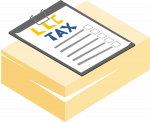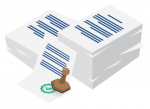Washington LLC Taxes
By default, Washington LLCs are taxed as pass-through entities. Pass-through taxation means the LLC doesn’t pay federal taxes directly. Instead, the revenue from the LLC passes through the business and on to the members/owners, who then must pay personal income tax on that revenue. Members/owners are obligated to pay the federal self-employment tax rate of 15.3%, or 12.4% for Social Security and 2.9% for Medicare. Washington business owners must also pay the state’s Business and Occupation tax, as well as sales and use tax, employer taxes, and other applicable local taxes.
In this article, we'll cover:


How Are Washington LLCs Taxed?
How will your Washington LLC be taxed? That depends on how many members are involved. A single-member LLC (SMLLC) is taxed by default as a sole proprietorship. By contrast, a multi-member LLC is taxed as a partnership by default. Here are the federal tax forms that LLCs with default status need to file:
- Single-member LLC—Form 1040 (usually Schedule C, but some SMLLCs file C-EZ, E, or F)
- Multi-member LLC—Form 1065
However, a Washington LLC may also elect to be taxed as an S-corp or C-corp. We’ll dive into the tax implications of those statuses below.
Washington LLCs taxed as S-corp
There are LLCs who will benefit from electing S-corp tax status, which you can do by filing Form 2553 with the IRS. LLCs who opt for S-corp status are taxed as pass-through entities, just like LLCs who opt for default tax status. In addition, electing S-corp status allows your business to make distributions to members, which aren’t subject to the 15.3% self-employment tax. This can be helpful when trying to attract business investors.
Before you apply for S-corp status, you’ll need to ensure you meet the IRS requirements for S-corps. We recommend bringing in a CPA at this point, as a CPA can tell you if electing S-corp status makes sense for your Washington business. When tax filing season comes, an LLC with S-corp status will have more complications to contend with than an LLC that’s filing with the default status. Finally, not every LLC will save money by electing S-corp status.
S-corps report their income to the IRS by filing Form 1120-S.
LLCs taxed as C-corp
LLCs can also elect to be taxed as a C-corp, which is the default tax status for corporations. Only a very small percentage of LLCs opt for C-corp status, yet there are some LLCs that can benefit. Among other things, C-corps are eligible for greater tax deductions than LLCs that maintain their default tax status. But, C-corps must pay the 21% federal corporate income tax and the applicable Washington Business and Occupation tax. If you’re interested in changing your LLC’s tax status to C-corp, be sure to talk to a CPA first, as they can go over the full list of pros and cons with you.
C-corps file Form 1120 with the IRS.
Learn how to apply for how to apply for C-corp status as an LLC.

Washington State Income Tax
There is no personal state income tax in Washington or corporate income tax. However, almost all businesses must pay the state’s Business and Occupation Tax. It’s a gross receipts tax based on the type of activity your business conducts.
There are five major classifications that most businesses will fall under. Their respective tax rates are listed below.
Service and Other Activities .015
Service and Other Activities – $1 million or more in total revenue – .0175
Retailing .00471
Wholesaling .00484
Manufacturing .00484
Although many businesses will fall under the “Service and Other Activities” category, it’s possible your business could qualify for multiple classifications. For example, if you run a hair salon, haircuts would be taxed under the “Service and Other Activities” category, while the sale of products like shampoo and conditioner would fall into the “Retailing” category.
There are also specialized B&O tax rates for industries like timber extraction and newspaper publication. The Washington Department of Revenue has a complete list of specialized tax classifications.

Sales and Use Tax
The state’s base sales tax rate is 6.5%. There’s also a local portion added that varies based on location. For example, the city of Vancouver, Washington, charges a local sales tax of 2.1%, bringing the total rate in the city to 8.6% for 2023.
Use tax rates come into play when goods are purchased for consumption or business use and sales tax hasn’t been paid. For example, let’s say you’re opening a restaurant in Vancouver, Washington but purchase tables from Oregon. There’s no sales tax in Oregon, so you could owe a use tax of 8.6%, which is the same rate as Vancouver’s sales tax.
You can use the Washington Department of Revenue’s Tax Rate Lookup tool to find your local sales and use tax rate.

Local Washington Taxes
You’ll need to follow the local tax laws in the city/county where your LLC is based and anywhere else that you do business. In addition to sales tax, some municipalities charge a local tax on certain goods and services like prepared foods, clothing purchases, and tattooing services. The highest local tax rate is 4.1 percent in the cities of Lynnwood, Mill Creek, and Mukileto, all of which are in the Seattle metro area. That means consumers in those cities pay a total tax rate of 10.6% on applicable purchases.

Other Taxes in Washington
Here are some other taxes that are imposed by the state of Washington.
Washington State Employer Taxes
If you are employer, you will need to pay unemployment insurance and workers’ compensation taxes:
- Unemployment Insurance (UI) Tax—Washington uses an experience-based system, which means your tax rate depends on two factors: the size of your payroll and how much your former workers collect in unemployment benefits. In 2022, the average unemployment insurance tax rate was 1.3%.
- Workers’ Compensation Tax—In Washington, employers must purchase insurance from the state or qualify to be self-insured. Private workers’ compensation coverage isn’t permitted. When you plan to hire employees, you must either apply for or update your state business license. A state account manager will then set up your policy and send you information about your rate. Base rates are set using risk classification levels from the state. Jobs that are considered riskier pay higher rates. So, someone running an roof repair business will pay more for insurance than someone running a vineyard.
Industry Taxes
The Washington Department of Revenue also imposes taxes on certain industries. The following is a list of industry-specific taxes in Washington:
- Motor vehicle sales/use tax
- Rental car tax
- Convention and trade center tax (King County only)
- Hotel/motel tax
- Hazardous substance tax
- Leasehold excise tax
- Litter tax
- Oil spill response tax
- Oil spill administration tax
- Petroleum products tax
- Refuse collection tax
- Solid fuel burning device fee
- Spirits taxes
- Syrup tax
- Tire fee
- Tobacco products tax
- Tourism promotion area charges
- Transient rental income
- Vapor products tax

Do foreign LLCs in Washington need to pay Washington taxes?
Yes. It doesn’t matter if, for instance, you started your business over the state line in Oregon. A Washington foreign LLC (an LLC that does business in Washington but wasn’t formed there) is still obligated to pay taxes in every municipality where it does business. Your local government office can be a helpful resource for foreign LLCs, so check with them in the city or county where your business is operating. Local officials can tell you if you must pay sales, use, or other taxes.





